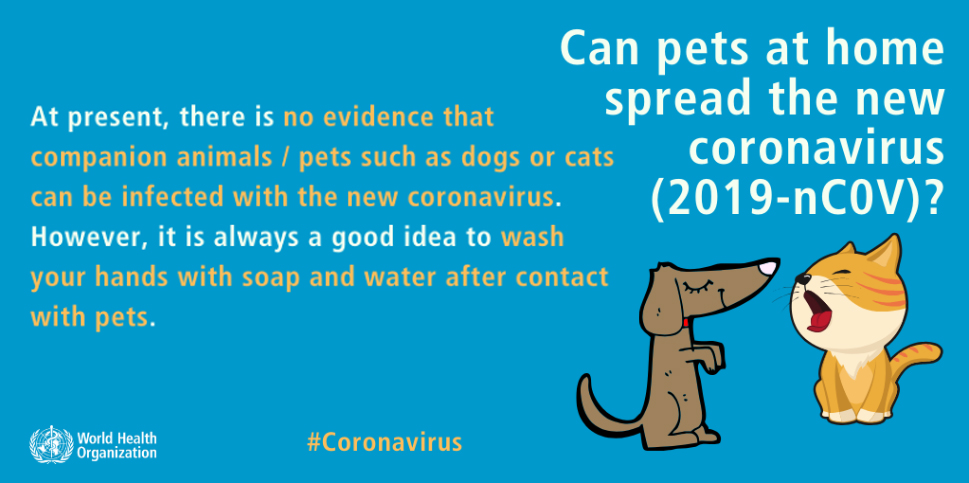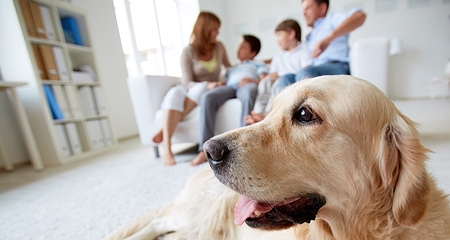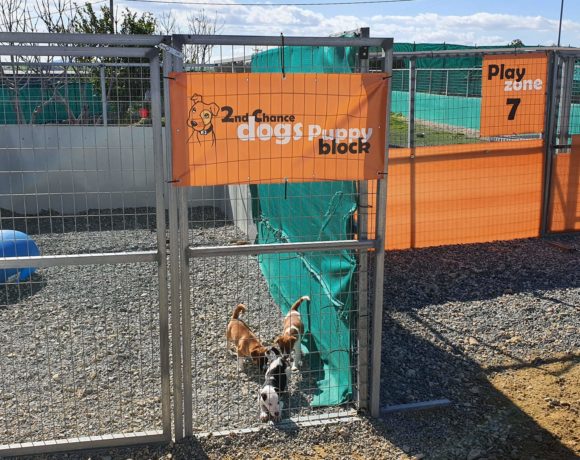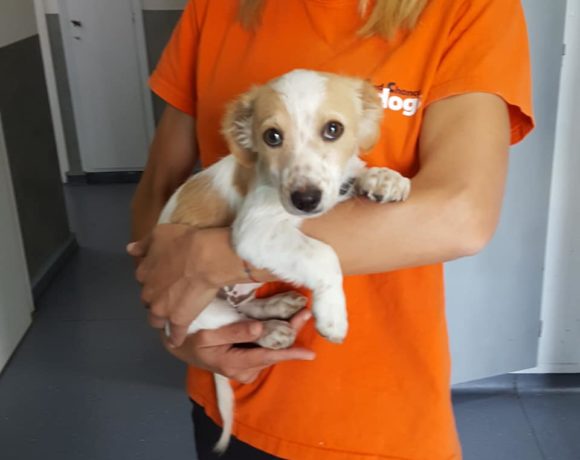Covid-19
Advice for self-isolating pet owners
.
Can dogs catch Covid-19?
There is no evidence to show that dogs can transmit the Covid-19 virus to humans. The main source of infection for the Covid-19 virus is human-to-human transmission.
The spread of Coronavirus (COVID-19 virus) is now having a direct impact on everyone’s daily lives, following the most recent instructions from the Government. So it’s no surprise a lot of dog owners are worried for their four-legged friends. We’ve been answering some of your questions.
The good news is, current advice from the World Health Organisation is that there’s no evidence that pets can be a source of infection or that they can become sick from COVID-19.
We encourage all pet owners to take sensible precautions, and follow the latest guidelines. We’ll also be keeping this page updated as the situation evolves.
We would like to reassure you that there is still no evidence to show that dogs can transmit the Covid-19 virus humans.
New information on COVID-19 is rapidly evolving, and information will be updated as it becomes available.

LETS TAKE CARE OF OUR PETS
IN THESE DIFFICULT TIMES
Coronavirus (Covid-19) advice for self-isolating / Locked down pet owners
There is currently no evidence that pets can become sick from COVID-19, so it’s highly unlikely they are at risk. There is also no evidence that companion animals can transmit Covid-19 to people either, however it’s possible that the virus may survive on pets’ fur for a short time, as with other surfaces. The situation is changing rapidly though, and more is being discovered about this new virus as time goes on. Until more is known, it’s sensible to take precautionary measures to protect our pets.
We’d advise minimising contact with your pet as much as possible while you are sick. Maintaining good hygiene practices is always sensible, such as washing your hands with hot water and soap before and after handling and feeding.
Make sure you have a plan of who can look after your dog in the event you get really ill.
There is no need for your pet to stay somewhere else during this time. However, when self-isolating on medical advice, you will need to make sure your pets continue to be properly looked after. If this will be challenging then you could consider asking someone else to look after your pet during this time.
If your pet is staying with you, try to minimise contact as much as possible. Yes, this means avoiding snuggling or cuddling as much as possible until you are better! We know this is difficult, so it may help to have another person in your household take on the day-to-day care of your pet while you are ill. Make sure you thoroughly wash your hands before and after touching your pet, their food or other pet related items, or when disposing of their waste, and follow all other government self-isolation guidelines. The main reason is that if you or someone in your house has symptoms or Covid-19 then you don’t want to be transferring the virus via your pets fur if everyone is touching you family pet.
A friend or relative may be able to care for your dog for you if you have symptoms, or are vulnerable or elderly, but let them know in advance if you are self-isolating and follow strict government guidelines when handing over your dog, maintaining social distancing measures and a distance of at least 3 meters when handing over your dog to a friend or relative and ask them to bring their own lead. Always wash your hands before and after handling your dog and preparing their food, and ask whoever cares for your dog to do so as well.
If you are unwell and have no-one else in your household able to look after your dog, contact your friends and family or a neighbour to see if they can help. If you are self-isolating, you should not go out at all.
It’s a good idea to create a plan in advance should you find yourself unable to take care of your beloved dog.
If you need help with shopping pet food you could try setting up a WhatsApp group to build a connection with other dog owners in your neighbourhood who could help to pick up essentials such as picking up dog food on a trip to the supermarket. Local Authorities or community groups may be providing additional support.
If that’s not possible, you might want to contact your local boarding kennels to see if they have space available.
If you’ve moved recently or changed your phone number, ensure these details are up to date on your dog’s microchip.:
You should restrict contact with pets and other animals while you are sick with COVID-19, just like you would around other people. Although there have not been reports of pets or other animals becoming sick with COVID-19, it is still recommended that people sick with COVID-19 limit contact with animals until more information is known about the virus.
When possible, have another member of your household care for your animals while you are sick.
Do ensure that somebody can take care of your animal if you are hospitalised. Some dogs may become nervous, anxious, and even aggressive if they feel unsafe at a new place, so it would be better for somebody to feed and play with them in the pet´s own home. However, if there is lockdown and depending on the goverments instructions at the time, the best thing to do is to have someone (preferably individual that dog is already familiar with) take the pet to a new temporary home where it will be better taken care of as soon as you feel you are showing symptoms of the illness as if the illness progresses aggressivly you may not have time to do it later.
Pets have been shown to be a great company and may even decrease stress levels and suicidal tendencies, something that can be extremely positive during the current pandemic lockdown. We highly recommend all pet owners take care of their animals and keep calm. Abandonment should not be an option in any circumstance. Be a responsible owner, continue giving love, care and attention to your pet.
Although there have been no reports of pets or other animals becoming sick with COVID-19, it is still recommended that people sick with COVID-19 limit contact with animals until more information is known about the virus. This can help ensure both you and your animals stay healthy. There is still much to be learned about COVID-19 and more information will become available as the time passes. If you must care for your pet or be around animals while you are sick, wash your hands before and after you interact with pets and wear a facemask.
Managing children and dogs
in the home
Tips for managing children and dogs in the home.
Create safe spaces and sleeping places for your dog.
Dogs are social animals who enjoy company, and many will want to be involved in whatever activity is happening at home.
Feeling safe and secure is very important to dogs, so ensuring they have an area of their own will help them adjust to a sudden change in routine and lots of time together in the home.
Child-gates and puppy pens (similar to young children’s play-pens) can also provide dogs a safe area from which they may still remain connected to family activity.
It’s important to talk to your children about your dog’s den as a safe space to help them understand why dogs shouldn’t be disturbed when they are resting. If you’re going to pop your dog in their den at any point, to concentrate on homework or a P.E. session for example, make sure your dog has something fun to enjoy, so that they learn that their den is always rewarding and enjoyable.
Make time to play with your dog. This will help prevent your dog becoming bored, restless or frustrated.
Let your children know the structure of the day in advance. They may also enjoy planning games to play with your dog.
Like us, dogs don’t enjoy being teased, nor do they understand the difference between our toys and theirs, so it’s best to keep any toys they shouldn’t play with safely out of their reach.

.
.

.
What can I do to keep my dog active?
It challenging to keep your dog active now we’re all advised to stay at home and avoid others.
Here are some tips to try indoors or in a garden, if you have one:
– try playing hide and seek with your dog – hiding treats or toys around the house for them to find
– if you have a garden you can let them out to play, run around, sniff and explore
– teach your dog a new trick or practise training
– Click on the link below to watch a video with more tips
Self-isolating? How to keep your dog happy and stimulated at home
Dogs at rescue centres, dog shelters and community pounds are in need of assistance!
Dogs should not become the victims in this pandemic. They are vulnerable, and they need our help and protection. As there is no evidence that stray dogs or cats can transmit COVID-19 to people or get sick from it, we don’t need to be scared or concerned about these animals passing on the infection.
As always, we should follow all sanitary recommendations as indicated by health authorities, such as hand washing.
What can I do to help animals living in the street during this crisis?
Since the primary way to stop the outbreak is to stay at home, leaving your home to provide food or water to a dog or cat should involve eliminating all non-essential interactions outside the house.
If there are animals who depend on you for food or water, place these without interacting with the animal, as the same animal might be fed by multiple people in the community whose medical and travel histories are unknown. The governments is issuing specific permits for organizations and individuals who feed street dogs/cats.

.
Donate
A lot of animal shelters seem to be suffering because people are no longer donating, and volunteers can no longer go to the facilities. We are no exception.
One unfortunate side effect of the pandemic has been that shelters and rescue centers are no longer able to take volunteers, funding has dropped, and people that could otherwise adopt, are not doing so. New intakes have halted as dogs cannot be rehomed becuse of social distancing, this is dangerous to animals that depend on this care for their survival and welfare. Donating food or money could be an easy and helpful thing to do.
Dogs are still in need and the work of 2nd Chance Dogs goes on 365 days a year with no exception even in a pandemic. We’d be grateful for any donation amount you can spare to support our ongoing efforts to help animals at this difficult time and into the future.
2nd Chance Dogs still has to pay for food, k9 carers salaries, utilitiy bills medications and vet bills. and your generous monetary donation will be gratefully accepted, particularly during this stressful time.
Again, thank you for standing with us and our dogs, especially now. Please check back for any future updates, and stay safe!
This uncertain and stressful time is also a wonderful opportunity to unify behind a common love of animals.
COVID-19 does not discriminate; people from all backgrounds and communities will be impacted.
A deep connection to animals transcends socio-economic, racial, ethnic and geographic boundaries and honoring that bond with compassion, not judgment, is a very simple yet impactful way to contribute positively in your community during this crisis.
Pet Health
OIE - Advises that people who are ill with COVID-19 should limit close contact with their pet until more is known about the virus. When handling pets, adhere to basic hygiene measures. This includes hand washing before and after being around or handling animals, their food, as well as avoiding kissing, licking or sharing food. Further information is here.
WSAVA - World Small Animal Veterinary Association’s guidelines are here
FVE – Federation of Veterinarians of Europe find updates and resources from FVE here
FECAVA - BSAVA's European Association’s guidelines for practices are here and for clients here
The American Veterinary Medical Association (AVMA) - AVMA have general resources alongside those specific to their region available here.
CFSG - information can be found here.
PVA - Pancyprian Veterinary Association here.
Human Health
WHO - Practices can share their infographic on their websites or on social media to allay any fears clients might have about the virus and their pets. It can be accessed here.
CDC – Centers for Disease Control and Prevention info found here:
PIO – Cyprus press information office here.




